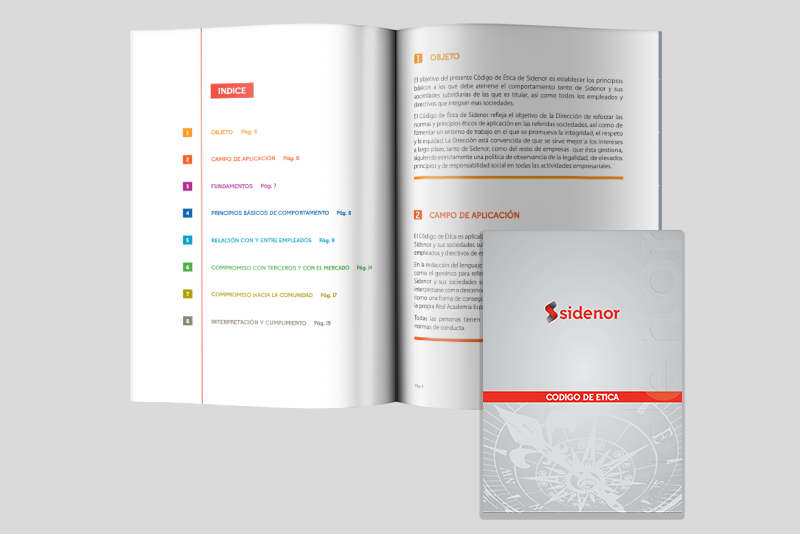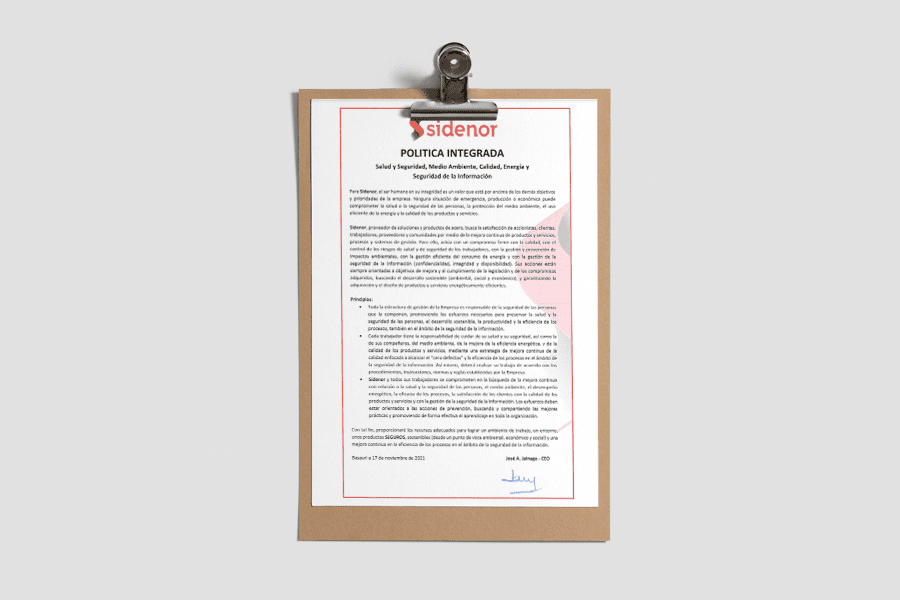
Ethics & Good Governance
At SIDENOR there are various policies that identify and demonstrate our principles, values and commitments and help us to carry out all our operations honestly and ethically, sustainably, with transparency and always in compliance with the legislation in force.
Code of Ethics
This code sets out the principles and values that govern our performance. It is a fundamental document for the successful management of our business, and reflects the Senior Management’s goal of reinforcing the rules and principles of ethics applicable to the company and fostering a working environment conducive to integrity, respect and fairness. The Senior Management are convinced that the best interests of SIDNOR and the other companies that it manages are best served in the long term by a policy of strict observance of the requirements of law, high ethical standards and social responsibility in all corporate operations.
General Policies
Integrated Policy
This policy sets out the principles that guide the actions of the company in regard to health and safety, environmental matters, quality, energy and information security, given that we see our operations as a single whole. This includes SIDENOR’s commitment to making all necessary efforts to safeguard the health and safety of persons and to foster sustainable development (environmental, social and financial), the quality of products and services and the effectiveness and efficiency of processes, including those in the area of information security.
Purchasing Policy
It defines the basic principles for the purchase of goods and services that are necessary for our business under the best possible quality, service and cost conditions.
Corporate Policies
Anti-corruption & Fraud
The company’s anti-corruption and fraud policy lays out guidelines to be followed by the whole workforce of SIDENOR in combating corruption and fraud and ensuring that neither the company not its workforce benefit in any way from business operations or actions which are unlawful or which contravene the Code of Ethics and the corporate policies which implement it.
Conflicts of Interest
The company’s policy on conflicts of interest sets out the guidelines to be followed at SIDENOR to prevent and deal with any conflicts of interest encountered by a member of the workforce in their dealings with the company. The aim is to prevent the personal, professional, financial and other private interests of individuals from clashing with those of SIDENOR and thus interfering with their objectivity or loyalty.
Competition
The policy on compliance with regulations on competition seeks to set out principles for action to prevent practices considered as unfair competition by fostering compliance with the legislation in place to defend competition and prohibiting conduct contrary to free competition.
Human Rights
The human rights policy sets out SIDENOR’s commitment to respect human rights and public freedoms as included in the Universal Declaration of Human Rights and to lay down principles and guidelines for action at SIDENOR to ensure respect for the human rights recognised in domestic and international law in all the company’s operations, in regard to both its workforce and third parties.
Risk Management
General Risks
SIDENOR has a risk management system in place that enables it reasonably to ensure that all significant risks (strategic, operational, financial, compliance and governance-related) to which the organisation is exposed in regard to internal or external factors are anticipated, continually monitored and reduced to assumable, tolerable levels as defined by the Senior Management.
The Senior Management have identified the main risks and set in place a risk management and control policy which establishes a general framework for action to regularly update the risk map at SIDENOR and ensure constant supervision so that risks to the business are detected promptly and action can be taken quickly to minimise their impact.
Risks under Criminal Law
SIDENOR has a programme in place to prevent risks under criminal law, the purpose of which is to provide the company with a prevention and control system to reduce the risk of any criminal offence being committed in the course of its business and professional activities. Risks of criminal offences that could potentially affect the company are analysed, including corruption, bribery, influence peddling and money laundering, and the internal control system then seeks to prevent and mitigate whole or in part such offences by carrying out regular checks.









